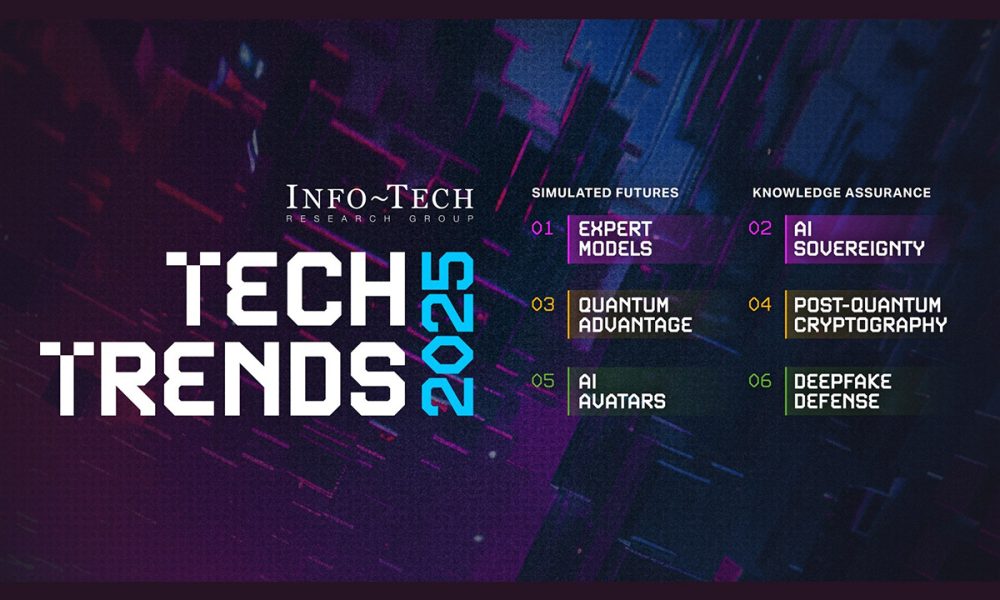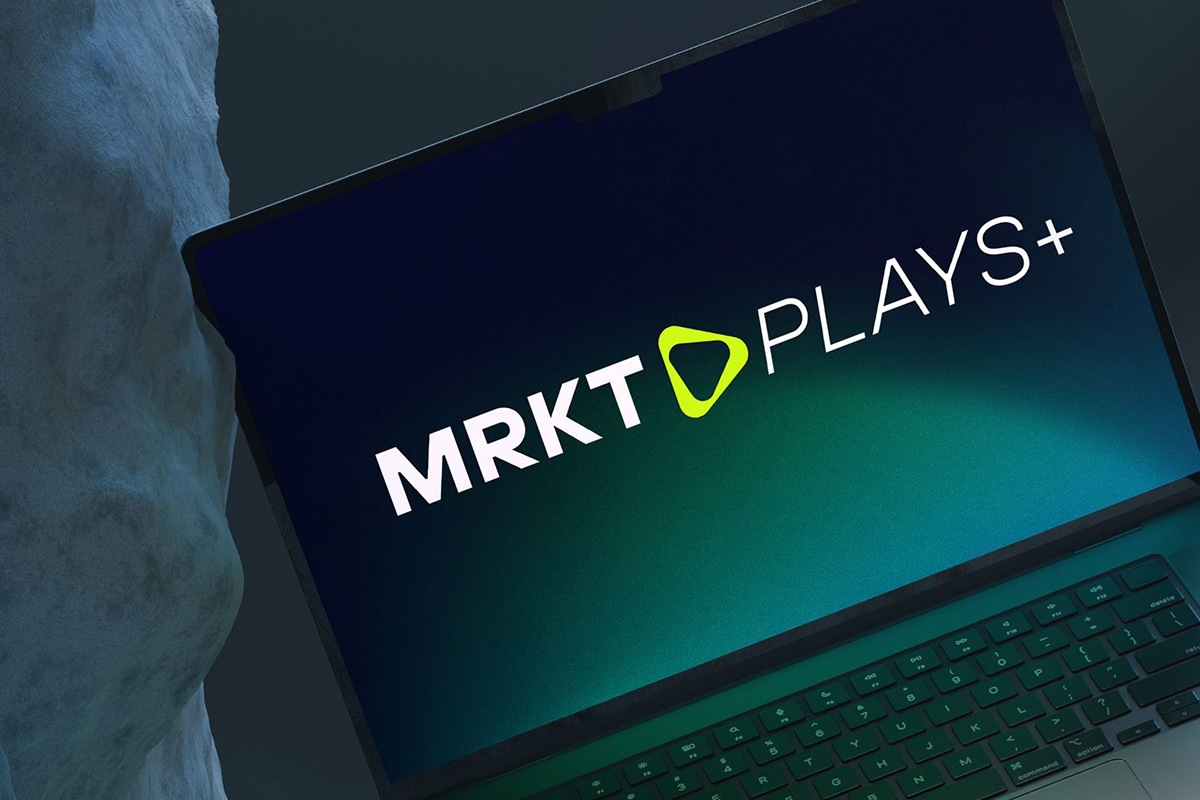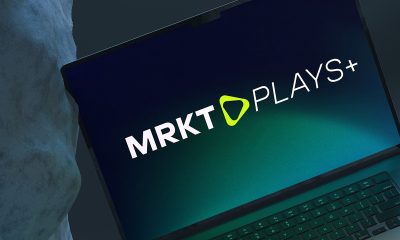Affiliate Industry
2025 Tech Trends Report: Info-Tech Research Group Unveils New Insights on the Future of AI, Quantum Computing, and Cybersecurity

Info-Tech Research Group’s newly released Tech Trends 2025 report highlights six pivotal trends poised to transform the IT landscape in the coming year. As the pace of technological innovation accelerates and organisations are facing unprecedented challenges and opportunities, the firm’s report provides insights into how IT leaders can harness technologies like artificial intelligence (AI), quantum computing, and cybersecurity while mitigating the risks they introduce.
Historically, chief information officers (CIOs) have been tasked with preserving the integrity of an organisation’s past through meticulous recordkeeping. However, in 2025, the global IT research and advisory firm reports that the role of the CIO will evolve as the focus shifts from maintaining the past to forecasting the future. With the rise of generative AI and the impending era of quantum computing, Info-Tech explains that CIOs will need to increasingly adopt forward-thinking strategies to anticipate and simulate future business scenarios.
‘Across the UK, we’re witnessing a transformative shift driven by technological advancements, including in both AI and quantum computing,’ says Nora Fisher, senior vice president of global market programs at Info-Tech Research Group. ‘Sectors such as financial services and healthcare are harnessing the potential of generative AI to enhance customer experiences and operational efficiency. As organisations continue to embrace AI-driven innovations, balancing data security, privacy, and governance remains a top priority.’
The Tech Trends 2025 report is informed by Info-Tech’s Future of IT 2025 survey. The survey gathered responses from nearly 1,000 IT decision-makers globally between March and July 2024, with contributions from key regions such as the UK, the United States, Canada, and APAC, and representation from 17 industries, including financial services, healthcare, government, and manufacturing. In addition, expert interviews conducted with representatives from organisations such as the Blockchain Research Institue, Nubinary, Kyield, SAS, Xprize Quantum, IBM Quantum Industry & Technical Services, HP Inc., Voices.com, SWEAR, and the University of British Columbia offer in-depth case studies and real-world examples of how organisations are navigating these trends.
‘At the intersection of digital transformation and exponential AI growth, IT leaders are entering a new era where forecasting probable futures will be just as critical as reporting on the past,’ says Brian Jackson, principal research director and lead author of the report. ‘Our 2025 Tech Trends report provides a roadmap for organisations to harness AI, quantum computing, and cybersecurity solutions to stay ahead of the curve.’
The six key tech trends identified by Info-Tech Research Group for 2025 are:
- AI Avatars and Chatbots:
Generative AI is making it increasingly difficult to distinguish between human and AI-generated interactions. AI avatars and chatbots, now integrated into many enterprise systems, are transforming user experiences and the way organisations handle customer service, software development, and marketing. However, the rise of deepfakes presents new security threats, raising the need for robust AI detection and defence mechanisms. According to Info-Tech’s Future of IT 2025 survey, 70% of respondents are already using generative AI chatbots, with Microsoft Copilot leading adoption at 78.84%. - Deepfake Defense:
With the increasing sophistication of AI-generated digital humans, deepfakes are becoming a powerful tool for fraud and misinformation. IT leaders are prioritising AI-powered detection tools and content authentication methods, such as blockchain, to combat the rising threat of AI-powered cyberattacks and ensure the integrity of their data. AI ranks as the second-most disruptive force to business operations, just behind talent shortages, with a disruption risk score of 3.55 out of 5, according to Info-Tech’s findings. - Quantum Advantage:
Quantum computing has moved beyond theoretical exploration and is now accessible through cloud platforms, enabling real-world business experiments. As organisations begin leveraging quantum hardware to solve complex problems, industries such as media, government, and financial services are leading the charge in quantum investments. Thirty-three percent of organisations in the media, telecom, and technology sectors are investing in quantum computing, followed by 27% in the public sector and 20% in financial services. - Post-Quantum Cryptography:
With the threat of quantum computers breaking current encryption methods looming on the horizon, organisations must prepare for “Q-day.” The adoption of post-quantum cryptography is now a critical priority, particularly for industries handling sensitive data, such as finance, healthcare, and government. Info-Tech reports that 31% of advanced IT departments plan to invest in post-quantum cryptography before the end of 2025, compared to 16% of average IT departments. This preparedness is critical as organisations face increasing risks from ‘Harvest Now, Decrypt Later’ cyberattacks. - Expert Models:
As AI matures, organisations are increasingly developing custom AI models tailored to their specific industries. These expert models improve the accuracy and relevance of AI outputs, enabling businesses to derive exponential value from AI investments. Info-Tech reports that 80% of high-maturity IT departments, or “Transformers,” have already invested in AI or plan to do so by the end of 2025, compared to 72% of average IT departments. Higher maturity firms are also twice as likely to expect exponential value from AI by 2025. - AI Sovereignty:
While AI offers significant opportunities, it also poses risks to industries such as music, news, and customer service. The firm explains in the report that organisations are focusing on balancing AI adoption with governance and control to protect sensitive data, reduce costs, and ensure AI performance. By 2026, more companies will run localised AI models to improve cost-effectiveness and maintain control over their AI initiatives. Privacy and security concerns top the list of factors influencing AI investment decisions, with 65% of respondents citing it as a key consideration.
‘Our survey data and expert interviews show a clear path forward for organisations to not only adopt these emerging technologies but also navigate the challenges they bring,’ says Jackson. ‘By understanding the risks and opportunities associated with AI, quantum computing, and cybersecurity, IT leaders can make informed decisions that will drive both innovation and security.’
As organisations prepare for the future of IT, Info-Tech’s Tech Trends 2025 report provides the strategic guidance needed to stay competitive and secure. From leveraging AI avatars and quantum computing to safeguarding data with post-quantum cryptography, the firm advises that IT leaders must act now to future-proof their operations in the coming months.
Download and read the full Tech Trends 2025 report for more insights for the year ahead.
For media inquiries or interview requests with Brian Jackson, lead author of the 2024 report and an expert on emerging technology trends, please contact [email protected].
Affiliate Industry
Catena Media Launches MRKTPLAYS+ to Expand Strategic Partnerships in North American iGaming

Catena Media announced a strategic evolution of its successful MRKTPLAYS subaffiliation platform, designed to meet market demand and deepen long-term partnerships across the regulated North American online casino and sports betting markets.
The launch of MRKTPLAYS+ enhances Catena Media’s existing subaffiliation model, introduced in 2025, by adding a modular partnership framework built to accelerate partner growth for publishers and adjacent digital businesses that have demonstrated product-market fit.
Alongside standard campaign access, MRKTPLAYS+ will offer tailored marketing and operational support including content and marketing advisory services, as well as working capital solutions and minority equity participation – all in accordance with partner needs and maturity.
The expanded offering will help high-potential partners scale more efficiently while strengthening long-term collaboration within Catena Media’s partnership network.
Pierre Cadena, Catena Media Chief Operating Officer, said: “MRKTPLAYS+ is a natural evolution of our subaffiliation model. It enables us to work more closely with selected partners by combining access to campaigns with operational support and, where appropriate, strategic capital. This approach is designed to support sustainable partner growth while reinforcing the quality, resilience and diversification of our revenue streams.”
The MRKTPLAYS+ launch aligns with Catena Media’s broader strategy of diversifying revenue streams, deepening strategic partnerships and building scalable platforms that support long-term value creation. The platform will be open to partners globally, with a core focus on North America.
The post Catena Media Launches MRKTPLAYS+ to Expand Strategic Partnerships in North American iGaming appeared first on Americas iGaming & Sports Betting News.
Affiliate Industry
Beyond Bonuses: Shaun Decesare’s Mission to Redefine Affiliate Integrity in iGaming

Reading Time: 5 minutes
Vision & Motivation
You mentioned this was a “pipedream 10 years in the making.” What finally gave you the push to take the leap into owning and rebuilding an affiliate site?
It was always a dream of mine to have my own business and ‘be my own boss’ so to speak. I’ve taken an interest in the iGaming sector from a very young age and I knew this was instantly a passion of mine. What gave me the impetus to take the leap was twofold. The first being that I had been delaying this for too long, I decided that this is it, I will take the leap of fate and live and die by my decisions. The Second being I wanted to get out of the monotonous 9-5 routine. Having a young family, I want to prioritise spending as much time with them as possible. Doing this has allowed me to do that.
What does success look like for you with CasinoBonus360—not just in terms of traffic or revenue, but in how the brand is perceived by users?
Taking the site back to its glory days of the late 2010s, having witnessed first hand the success of this whilst at my former role within Catena Media, I know its potential is through the roof. I want CB360 to be a trusted, well reviewed site that users can check out all brands with confidence that this is not just a money grab. The users are being put first.
Why is trust such a central pillar in your vision for the site? What do you think has eroded trust in this space, and how do you plan to rebuild it?
Trust is at an all time low in this industry, scams are everywhere you look. As a consumer, this is evident in all forms of the gambling industry. I want to right the wrongs of others and attempt to restore the faith back to what it once was. We plan to rebuild it through various means, such as delivering a top quality service to all our new and existing users. One that is meaningful and long lasting. This will triumph over any quick financial gain.
 Editorial Direction & Content Strategy
Editorial Direction & Content Strategy
You’ve emphasized tougher editorial standards and evergreen content. What does your editorial process look like now compared to the previous version of the site?
We are not comparing ourselves to anyone else because we do not know how other teams operated. The shift has to happen inside the own workflow. In the past, things were faster, more intuitive and less documented. Today the process is far more deliberate with clear research steps, structured fact checking, internal reviews, consistent criteria and a final quality pass. It is a more mature and more disciplined version of how we used to work, still personal but with higher standards and better control.
How are you ensuring your reviews and guides are genuinely useful to users rather than just SEO-driven?
We start with real user questions and not with keyword lists. Every claim needs a source or a test reference. If a keyword does not fit naturally, we leave it out. The content must read smoothly and help the reader get clarity and make a decision. Useful content performs better in the long run than keyword tactics.
Can you walk us through how your team scores or tests casinos? What makes your approach different from competitors’?
We play for real. We register, verify, deposit, withdraw and talk to support. We score what happens, not what is promised. No gut ratings and no hidden deals. Every score follows the same criteria and the same pressure test. If a casino fails on trust or transparency, it gets called out.
What are some examples of content you’ve either removed or completely rewritten during the rebuild—and why?
Anything that wasted space or repeated nonsense is gone. Old fluff bonus pages, outdated lists, weak guides and duplicated topics were cut. Only the content that delivers real answers survived. Everything else was removed because it did not deserve attention.
 SEO & Technical Evolution
SEO & Technical Evolution
You’ve worked with an SEO/site manager to shift toward a more data-driven SEO approach. What’s been the biggest mindset shift in how you approach SEO now?
We stopped chasing keywords and started aiming for accuracy. SEO is now a data tool, not a shortcut. We choose topics where we can deliver real value and real testing. No more trying to win fast. The goal is long term authority, not temporary spikes.
You’ve spoken about moving away from “keyword stuffing.” How do you balance SEO goals with writing content that feels natural and user-focused?
We write like humans and fix anything that sounds robotic. SEO helps with structure, but it never dictates the voice. If the text feels fake or over optimized, it gets rewritten. Users come first. Algorithms follow later.
What are the key technical improvements you’ve made (or plan to make) to the site’s infrastructure to support long-term stability and performance?
We stripped the site down and rebuilt it in a way that does not break every time the internet sneezes. The code is cleaner, the plugins are trimmed down, caching is actually doing its job and every asset is optimized instead of thrown in raw. The structure is modular so we can grow without creating a monster we cannot maintain.
We also stopped pretending that Google is the only gatekeeper. Search is shifting toward AI driven answers, so the site needs to be fast, clear and machine readable. That means better schema, tighter linking, cleaner layouts, consistent data structures and content that is easy for AI systems to interpret. The goal is not just ranking but becoming the source that AI tools pick because the information is solid and well structured.
 Industry Insights & User Perspective
Industry Insights & User Perspective
With your background in the gaming industry, what are the biggest misconceptions affiliate sites have about what players want?
Number 1 is surely welcome bonuses, these are a thing of the past. The average consumer is now smart enough to know that welcome bonuses are traps. They actually have the opposite intended effect of what they were originally designed to do. In fact, we are targeting brands that have as low of a wagering requirement as possible. We do not enlist brands that have over 20x wagering requirements. This is completely unrealistic to anyone to ever obtain any chance of a withdrawal. Gambling should be fun, it should not increase the anxiety of the user.
What red flags do you think users should be aware of when reading affiliate content on other sites?
Always check out the authors on site and see if they are real people, most sites put down fake characters for one reason or another which just erodes the authenticity of the brand. This is by far away my number 1 red flag.
How are you collecting feedback from users, and how does that inform your content and design decisions?
We are conducting surveys with our users on a monthly basis and asking for what they like and what they don’t like. This will allow us to adjust our articles and content accordingly. We firmly believe in consumer first at CB360 and this is the motto will stand by for the lifespan of our site.
 Looking Forward
Looking Forward
What challenges are you expecting in the next 6–12 months, and how are you planning to tackle them?
The number one challenge is to increase the traffic on site. Whilst we have overhauled all the outdated content with brand new, relevant, beautiful pieces of work, we are still struggling to see a big increase in traffic. This may be due to google updates that have hampered SEO of late. We are looking at all avenues into new avenues to increase traffic.
Do you see CasinoBonus360 expanding into new verticals, formats, or markets in the future?
For now, we shall take things one step at a time, we have a 12 month plan which we are executing, and should it come to fruition, we will examine our options further down the line.
If you could give one piece of advice to someone considering launching or rebuilding an affiliate site today, what would it be?
Get ready for a lot of work, it is easier said than done, but the rewards will be worth it.
The post Beyond Bonuses: Shaun Decesare’s Mission to Redefine Affiliate Integrity in iGaming appeared first on European Gaming Industry News.
Affiliate Industry
MelBet Partners to Bring UFC Champion Kamaru Usman to SiGMA Central Europe

Reading Time: < 1 minute
SiGMA Europe is one of the most significant events in the iGaming industry. This year, the event is taking place in Rome and will bring together over 30,000 attendees, 1200 sponsors and feature four stages with 550+ top speakers.
On November 05, in partnership with MelBet Partners & Affiliates, former MMA legend and World Champion Kamaru Usman will join the event as a special guest. At booth 5067G attendees of SiGMA Central Europe have the chance to take photos, hear insights and what it takes to rise to the top on a global stage.
During the conference, there will be two activities available for guests at MelBet’s booth:
Punch Challenge. Anyone can come to the booth on November 4 and test their punching power. The person with the strongest punch will have the honour of competing against Kamaru Usman himself.
Want to get exclusive merchandise and take a photo with the MelBet Partners & Affiliates championship belt? Visit the booth. Follow MelBet’s official Instagram account and take a picture with the belt. Those who post a story with the championship belt and tag MelBet will automatically be entered into a drawing for exclusive UFC-themed merchandise.
There will also be a private party, Triumph of the Gladiators, exclusively for the partners and representatives of MelBet Partners & Affiliates, which Kamaru himself will attend. This evening will be an epic event, where history and modernity merge into one.
The post MelBet Partners to Bring UFC Champion Kamaru Usman to SiGMA Central Europe appeared first on European Gaming Industry News.
-

 iGaming7 days ago
iGaming7 days agoPRAGMATIC PLAY UNEARTHS PROGRESSIVE MULTIPLIERS IN ROLLING IN TREASURES
-

 Comatel6 days ago
Comatel6 days agoCOMATEL CELEBRARÁ UNA FIESTA PARA CIENTOS DE OPERADORES TRAS FINALIZAR EL PRIMER DÍA DE LA FERIA ESPAÑOLA, INTERAZAR
-

 ELA Games7 days ago
ELA Games7 days agoELA Games Powers the Reels with Retro-Electric Slot “Rapid Wild”
-

 Booming Games7 days ago
Booming Games7 days agoBooming Games Introduces Instastrike, the Latest Diamond Hits Trio
-

 Africa7 days ago
Africa7 days agoGaming Realms Makes South African Debut in Partnership with Hollywoodbets
-

 Alex Green Vice President Games at ZEAL7 days ago
Alex Green Vice President Games at ZEAL7 days agoWunderino Adds ZEAL’s Premium Slots as Partnership Kicks Off
-

 Blueprint Gaming7 days ago
Blueprint Gaming7 days agoNew collect modifiers and dual bonus offering star in Blueprint Gaming’s King Kong™ Splash
-

 Brasil7 days ago
Brasil7 days agoBrasil evita choque fiscal y apuestas entran en fase reputacional en LATAM





 Editorial Direction & Content Strategy
Editorial Direction & Content Strategy















